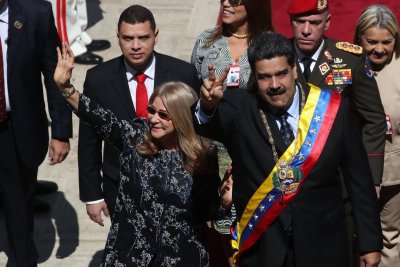Prosecutors unseal narco-terrorism indictment against Maduros and others

Venezuelan President Nicolas Maduro, right, and Venezuelan first lady Cilia Flores, left, are accused of narco-trafficking and related crimes in a federal indictment unsealed Saturday in the U.S. District Court for Southern New York. Photo by Miguel Gutierrez/EPA-EFE
Jan. 3 (UPI) — Venezuelan President Nicolas Maduro and his wife, Cilia Flores, are indicted on federal charges accusing them of narco-terrorism conspiracy and three related charges.
They also are accused of cocaine importation conspiracy, possession of machine guns and destructive devices, and conspiracy to possess machine guns and destructive devices in a federal grand jury indictment in the U.S. District Court for Southern New York.
“For over 25 years, leaders of Venezuela have abused their positions of public trust and corrupted once-legitimate institutions to import tons of cocaine into the United States,” said Jay Clayton, U.S. Attorney for Southern New York, in the federal indictment.
Maduro “is at the forefront of that corruption and has partnered with his co-conspirators to use his illegally obtained authority and the institutions he corroded to transport thousands of tons of cocaine into the United States,” Clayton said.
He said Maduro has “tarnished every public office he has held” by engaging in narco-trafficking while protected by Venezuelan law enforcement since at least 1999.
Clayton accuses Maduro of partnering with criminal organizations, including the Sinaloa and Zetas cartels in Mexico and Tren de Aragua in Venezuela, and Colombian Marxist rebel groups Fuerzas Armadas Revolucionarias de Colombia aka FARC and Ejercito de Liberacion Nacional aka ELN to engage in narco-trafficking.
He said Maduro provided drug traffickers with diplomatic passports and diplomatic cover for planes used by money launderers to retrieve drug proceeds from Mexico and fly them to Venezuela.
Maduro “now sits atop a corrupt, illegitimate government that for decades has leveraged government power to protect and promote illegal activity, including drug trafficking,” Clayton argued.
He said Maduro illegitimately claimed to have won the 2018 Venezuelan election for president after succeeding former President Hugo Chavez, who died in 2013, while Maduro was vice president.
Maduro also falsely claimed to have won Venezuela’s 2024 election and never has been a legitimately elected president, according to Clayton.
Maduro’s wife, Flores, also been a highly placed politician in Venezuela and was president of the National Assembly and attorney general before marrying Maduro in 2013.
Both are accused of participating in, perpetuating and protecting a “culture of corruption in which powerful Venezuelan elites enrich themselves through drug trafficking and the protection of their partner drug traffickers,” Clayton said.
Venezuela has been a safe haven for drug traffickers who paid for protection and support corrupt Venezuelan officials and military members, who enable them to operate outside the reach of Colombian law enforcement and armed forces that receive anti-narcotics help from the United States.
They ship processed cocaine from Venezuela to the United States “via transshipment points in the Caribbean and Central America, such as Honduras, Guatemala and Mexico,” Clayton said.
State Department officials estimate between 200 and 250 tons of cocaine are trafficked through Venezuela every year.
“The defendants, together and with others, engaged in a relentless campaign of cocaine trafficking” and distributed “thousands of tons of cocaine to the United States,” according to Clayton.
The Maduro’s son, Nicolas Ernesto Maduro Guerra aka Nicolasito aka The Prince also is among four other defendants named in a 25-page federal indictment that was unsealed on Saturday.
None of the other four indicted are in U.S. custody as of Saturday.
Also indicted is Hector Rusthenford Guerrero Flores aka Nino Guerrero who is the alleged leader of the Tren de Aragua gang that originated in Venezuela.
Diosdado Cabello Rondon, Venezuela’s minister of Interior, Justice and Peace of Venezuela, and Ramon Rodriguez Chacin, who formerly held the same position and is a former naval officer and government liaison with cocaine-producing Marxist FARC rebels in Colombia, also are named in the indictment.
Maduro and his wife likely will be arraigned in federal court next week.

